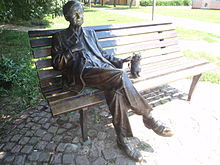Sándor Weöres
This article has multiple issues. Please help improve it or discuss these issues on the talk page. (Learn how and when to remove these template messages)
|
Sándor Weöres | |
|---|---|
 | |
| Born | Sándor Weöres 22 June 1913 |
| Died | 22 January 1989 (aged 75) |
| Alma mater | University of Pécs |
| Occupation | Poet |
Sándor Weöres (Hungarian pronunciation: [ˈʃaːndor ˈvørøʃ]; 22 June 1913[1] – 22 January 1989[2]) was a Hungarian poet and author.
Born in
Eucharistic Congress and then visiting Vietnam and India.[6] During World War II
Weöres was drafted for compulsory labor, but was not sent to the front. After the end of the war, he returned to Csönge and briefly lived as a farmer.
In 1948 Weöres again travelled abroad, living in Italy until 1949. In 1951 he settled in Budapest where he would reside for the rest of his life. The imposition of Stalinism in Hungary after 1948 silenced Weöres and until 1964 little of his work could be published.
Work
Weöres' translations into Hungarian were wide and varied, including the works of Ukrainian national poet
Shakespeare's Venus and Adonis and Henry VIII, T. S. Eliot's The Waste Land, the nonsense poems by Edward Lear and Lewis Carroll, the complete poetry of Stéphane Mallarmé,. His translation of the Tao Te Ching
continues to be the most widely read in Hungary.
Legacy
Many of Weöres' poems have been set to music.
Peter Eötvös
has composed two pieces, Atlantis and Ima with texts from Weöres' poem Néma zene ("Silent Music"), and in 2013 he composed Speaking Drums (Four Poems for Percussion Solo and Orchestra) based on the poems by Sándor Weöres.
In 1980 the Hungarian filmmaker
Nárcisz és Psyché
.
Works
Works in English
- Eternal Moment: Selected Poems by Sandor Weores, 1988
- Selected Poems, 1970
- Self-portrait: Selected poems by Sándor Weöres, 1991
Poetry
- Hideg van, 1934
- A kő és az ember, 1935[7]
- A teremtés dicsérete, 1938
- Meduza, 1944
- A szerelem ábécéje, 1946
- Elysium, 1946
- Gyümölcskosár, 1946
- A fogok tornáca, 1947
- Bóbita, 1955
- A hallgatás tornya, 1956
- Tarka forgó, 1958
- Tűzkút, 1964
- Gyermekjátékok, 1965
- Merülő Saturnus, 1968
- Zimzizim, 1969
- Psyche, 1972
- Télország, 1972
- Priapos, written in 1950, published posthumously in 2001
References
- ISBN 978-963-86258-8-5. Retrieved 16 April 2024.
- ^ Zsolt, Diós. "A nap sztorija – Weöres Sándor, a költőzseni". Behir (in Hungarian). Retrieved 16 April 2024.
- ISBN 978-91-554-4614-7. Retrieved 16 April 2024.
- ^ "Weöres Sándor". pte.hu (in Hungarian). Retrieved 16 April 2024.
- ^ Irodalomtörténet: a Magyar Irodalomtörténeti Társaság havi folyóirata (in Hungarian). A Magyar Irodalomtörténeti Társaság. 1988. p. 524. Retrieved 16 April 2024.
- ISBN 978-0-85646-185-9. Retrieved 16 April 2024.
- ^ Books from Hungary. Hungarian Publishers and Booksellers Association. 1967. p. 24. Retrieved 16 April 2024.
